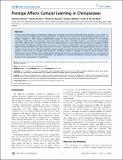Files in this item
Prestige affects cultural learning in chimpanzees
Item metadata
| dc.contributor.author | Horner, Victoria | |
| dc.contributor.author | Proctor, Darby | |
| dc.contributor.author | Bonnie, Kristin E. | |
| dc.contributor.author | Whiten, Andrew | |
| dc.contributor.author | de Waal, Frans B. M. | |
| dc.date.accessioned | 2013-11-05T13:01:02Z | |
| dc.date.available | 2013-11-05T13:01:02Z | |
| dc.date.issued | 2010-05-19 | |
| dc.identifier | 4595311 | |
| dc.identifier | a31f38dd-da53-4eac-a110-466a2e2e31d3 | |
| dc.identifier | 000277845400001 | |
| dc.identifier | 77956290914 | |
| dc.identifier.citation | Horner , V , Proctor , D , Bonnie , K E , Whiten , A & de Waal , F B M 2010 , ' Prestige affects cultural learning in chimpanzees ' , PLoS One , vol. 5 , no. 5 , e10625 . https://doi.org/10.1371/journal.pone.0010625 | en |
| dc.identifier.issn | 1932-6203 | |
| dc.identifier.other | ORCID: /0000-0003-2426-5890/work/65014040 | |
| dc.identifier.uri | https://hdl.handle.net/10023/4168 | |
| dc.description.abstract | Humans follow the example of prestigious, high-status individuals much more readily than that of others, such as when we copy the behavior of village elders, community leaders, or celebrities. This tendency has been declared uniquely human, yet remains untested in other species. Experimental studies of animal learning have typically focused on the learning mechanism rather than on social issues, such as who learns from whom. The latter, however, is essential to understanding how habits spread. Here we report that when given opportunities to watch alternative solutions to a foraging problem performed by two different models of their own species, chimpanzees preferentially copy the method shown by the older, higher-ranking individual with a prior track-record of success. Since both solutions were equally difficult, shown an equal number of times by each model and resulted in equal rewards, we interpret this outcome as evidence that the preferred model in each of the two groups tested enjoyed a significant degree of prestige in terms of whose example other chimpanzees chose to follow. Such prestige-based cultural transmission is a phenomenon shared with our own species. If similar biases operate in wild animal populations, the adoption of culturally transmitted innovations may be significantly shaped by the characteristics of performers. | |
| dc.format.extent | 5 | |
| dc.format.extent | 294515 | |
| dc.language.iso | eng | |
| dc.relation.ispartof | PLoS One | en |
| dc.subject | Pan troglodytes | en |
| dc.subject | Wild chimpanzees | en |
| dc.subject | Tool use | en |
| dc.subject | Transmission | en |
| dc.subject | Rank | en |
| dc.subject | Innovation | en |
| dc.subject | Strategies | en |
| dc.subject | Behaviour | en |
| dc.subject | Skills | en |
| dc.subject | Q Science | en |
| dc.subject.lcc | Q | en |
| dc.title | Prestige affects cultural learning in chimpanzees | en |
| dc.type | Journal article | en |
| dc.contributor.institution | University of St Andrews. School of Psychology and Neuroscience | en |
| dc.contributor.institution | University of St Andrews. Institute of Behavioural and Neural Sciences | en |
| dc.identifier.doi | 10.1371/journal.pone.0010625 | |
| dc.description.status | Peer reviewed | en |
This item appears in the following Collection(s)
Items in the St Andrews Research Repository are protected by copyright, with all rights reserved, unless otherwise indicated.

